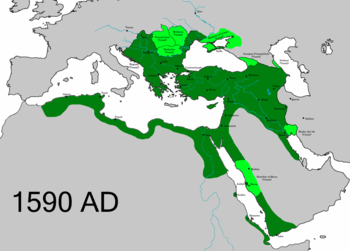Vassal state
A vassal state is any state that has a mutual obligation to a superior state or empire, in a status similar to that of a vassal in the feudal system in medieval Europe. The obligations often included military support in exchange for certain privileges. In some cases, the obligation included paying tribute, but a state which does so is better described as a tributary state. Today, more common terms are puppet state, protectorate, client state, associated state or satellite state.
Historical examples
Ancient China
From the time of the Zhou Dynasty (1046–770 BC) until the Han Dynasty (206 BC–220 AD), a varying number of vassal states existed in ancient China.
These ranged in size from small city states to vassals which controlled large swathes of territory such as the States of Chu and Qi. One of these vassal states would go on to conquer China and unite the country under the first emperor Qin Shi Huang.
Ottoman Empire

The Ottoman Empire (1299–1923) controlled a number of tributary or vassal states in the peripheral areas of its territory. Vassalage took a number of different forms with some states permitted to elect their own leaders. Other states paid tribute for their lands.
During the 18th century, the Ottoman Empire controlled many vassal and tributary states such as the principalities of Wallachia and Moldavia, or the Crimean Khanate.
See also
- Mandala (Southeast Asian political model)
- Puppet state
- Roman-Persian wars, during which vassal kingdoms played a key role
References
- Bryce, Trevor (2005). The Trojans and their neighbours. Taylor & Francis. ISBN 9780203695340.